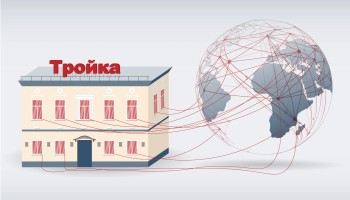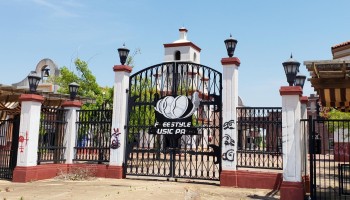Family members and close associates of Mihajlo Perenčević, a wealthy Croatian businessman with ties to Russian President Vladimir Putin, received millions of dollars from Russia under the guise of fictitious real estate purchases.
The funds were deposited in the recipients’ personal bank accounts in Austria, thereby possibly evading Croatian money laundering controls, taxes, and questions about their origins.
The exact source of the money is unknown. But the offshore company that made the payments is connected to a network that was used to launder funds stolen from the Russian state budget in the so-called “Magnitsky Case.” The transfers to Perenčević’s family and associates took place just as that money was being funneled out of Russia.
Reporters found the transactions — and some of the unfulfilled contracts that underpinned them — in a set of leaked records from Ukio Bankas. The now-defunct Lithuanian bank was central to the Troika Laundromat, a vast money movement scheme that was revealed by OCCRP and its media partners last year. The dozens of offshore companies that formed the Laundromat also used fictitious deals to justify large transfers of money out of Russia — and they also used Ukio bank accounts.
White Wedding
The sun shone onto Čikat, a beautifully laid out bay on the western side of Lošinj, one of Croatia’s largest and most charming islands in the northern Adriatic. A seaside promenade stretches along the water — but on that Saturday in March 2019 it was closed to the public. A prominent wedding was underway, and privacy was a top priority.
A photographer managed to take the only publicly available photograph of the event from a nearby boat: Guests squint into the sun just steps from the water under dozens of bouquets of red roses, which tower over them in oversized vases.
In the center is the couple, both from wealthy families. The father of Emil Tedeschi, Jr., the groom, owns one of the region’s largest food companies. And just behind the bride, Nika Perenčević, stands her father, with his characteristic mop of white hair: Mihajlo Perenčević.
Perenčević, who has spent much of his career abroad, cuts a mysterious figure in Croatia. His family avoids the spotlight, and when his business dealings are discussed in the media, he is described as a secretive tycoon about whom few details can be verified. Local outlets have speculated about Perenčević’s business outside of Croatia, but not much has been concretely established.
During the last years before Croatia’s independence, Perenčević spent five years in Libya working for a factory belonging to Montmontaža, a Yugoslav engineering and construction firm, according to a former company director, Darko Majić.
What Perenčević did after that remains unclear.
What is known is that, since at least 2010, he has led Velesstroy, a major Russian construction company that has won lucrative contracts from Transneft, the state-owned oil transport monopoly. Perenčević has received accolades from two Russian presidents for his work — despite an internal report from Transneft accusing another contractor he headed earlier of overcharging the state company and providing fraudulent paperwork.
Amerco and Velesstroy
Before becoming president of Velesstroy, Perenčević headed a British company called Amerco International Limited, which also received Transneft construction contracts.
It is unknown how Perenčević ended up working and living in Russia, but back on Lošinj he is now widely known as an influential operator. He says he has attracted millions of dollars of Russian financing to the island, which is apparent in the recent surge of investments by Jadranka, a longtime local tourism developer.
Perenčević’s connection with Jadranka appears to run deep. On its website, the local basketball team the company has sponsored for decades, KK Jadranka, thanks the “indispensable” Mihajlo Perenčević for his contributions to its success since its beginnings in the mid ’70s. The company’s longtime CEO, Sanjin Šolić, also played on the team.

Perenčević’s more recent connections to Jadranka are harder to discern, especially since its true owners are obscured behind its Russian management company. Local media have reported that Perenčević owns some of its properties, and, in fact, his right-hand man, Krešimir Filipović — the first vice president of Velesstroy — is president of Jadranka’s supervisory board.
Jadranka was acquired in 2013 by the management company, which belongs to a major Russian bank.
When asked by a Croatian media outlet whether he was behind the acquisition, Perenčević said cryptically that his money was not involved, but his influence was. It’s no wonder that local activists sometimes call him the island’s gubernator, borrowing the Russian word for “governor” to hint at his foreign connections.
Perenčević’s influence was on full display on the day of his daughter’s wedding: The public promenade where the celebration took place was closed to outsiders. The hotel just above it, the Bellevue, is the first five-star resort on the island. It was developed by Jadranka.
Ghost Real Estate
It is into this Adriatic refuge that reporters traced some of the banking transactions found in the leak from Ukio Bankas.
The data from the Lithuanian bank shows that Mayco Finance Holdings, an offshore company registered in the British Virgin Islands, made nine sets of monetary transfers totaling $24.2 million between 2008 and 2010.
Six of these went to Austrian bank accounts belonging to people associated with Perenčević; three went to other Croatian nationals. In eight out of nine cases, the transactions were marked as payments for real estate. (The ninth was marked with the name of the seller, but was also a real estate deal.)
The leaked data also contained contracts related to three of the nine deals, worth about $14.8 million in total. But the actual banking transfers associated with these contracts were much larger than what the contracts specified. Moreover, the Croatian land registry confirmed to reporters that Mayco never requested to be registered as the owner of these properties, and that the ownership changes were never enacted.
According to a money laundering specialist, these details lead to the conclusion that these deals may have been fictitious.
Sonja Cindori, a law professor at the University of Zagreb who studies anti-money-laundering efforts, noted that doing business with offshores is not in itself illegal and does not necessarily indicate money laundering.
However, while emphasizing that access to the details of the case file would be necessary for a full analysis, Cindori said that “it could potentially be concluded that these are fictitious sales with the possibility of money laundering.”
She pointed out several indicators of money laundering in the clauses of the contracts, including the interconnected nature of the people involved and the fact that the real estate never actually changed hands.
For this reason “it is logical to conclude” that fraud has taken place, she said, while cautioning that a fuller investigation of the related documents and money flows would be necessary to be certain.
Of the six remaining deals, one — the purchase by Perenčević of a legendary Los Angeles restaurant — appears to have actually taken place. It is not known whether the other five sets of payments resulted in actual transfers of ownership.
Overpriced Apartments
One of the recipients of the Mayco money was Krešimir Filipović, the first vice president of Velesstroy, the Russian construction company headed by Perenčević.
In April 2009, Filipović signed a contract to sell two Zagreb apartments to Mayco, the Ukio leak shows. In the contract, which treated the two apartments as a single property, Mayco agreed to transfer 1.97 million euros ($2.5 million) to Filipović’s Austrian bank account in two installments.
In fact, Filipović received about 25 percent more money than what was specified in the contract. By the time it was signed, Mayco had already transferred a total of 1.6 million euros ($2.1 million) to his account.
The deal was entirely fictitious. The Croatian land registry shows that Mayco never took possession of either apartment. Moreover, the registry shows, Filipović wasn’t even the owner of the larger apartment at the time of the “sale.” Along with a nearby parking space, that unit belonged to his father, Tomo Filipović.
Two years later, the younger Filipović sold his apartment to a real buyer for just over 90,000 euros ($130,000) — far less than the amount he received from Mayco in his Austrian bank account. His father sold the larger apartment for an unknown amount in 2015.
Krešimir and Tomo Filipović declined to comment.
All In The Family
Members of the Perenčević family also received millions from Mayco.
One was Siniša Cizel, the former husband of Perenčević’s recently remarried daughter, Nika.
Then still apparently married to her, Cizel received nearly 5.7 million euros ($7.9 million) from the offshore company between September 2008 and October 2010. Two mechanisms were used to justify these transfers: The sale of a Zagreb villa (which never took place) and the issuance of a loan (which appears never to have been repaid).
Despite a contract showing that Cizel sold the villa in Zagreb’s wealthy Medveščak neighborhood to Mayco for 4.9 million euros ($7.5 million) in 2009, Cizel never officially owned the villa — and Mayco never took possession of it. The home had been purchased in August 2004 by Nika Perenčević, Cizel's ex-wife, who still owns it today. She acquired it from an apparently unrelated seller for just over $700,000.
The same year, according to a loan agreement that appears in the Ukio data, Mayco granted Cizel a five-year loan of five million euros ($6.5 million). The data contains no indication that Cizel ever repaid it.
When asked by Ukio to explain its payments to Cizel, a representative of Mayco replied that he was “an expert in real estate market of Croatia. He looks for profitable opportunities and quite often buys ‘hot’ proposals in his name with financing coming from us under loan agreements.”
Reporters were not able to independently confirm Cizel’s real-estate expertise. He owns a printing company in Zagreb.
According to the Ukio data, Mayco also wired money to Nika's father, Mihajlo Perenčević, as well as his mother, Marta Perenčević.
In February 2009, Mihajlo Perenčević received 39,000 euros ($50,000) as an initial payment on a loan from Mayco. Reporters found no evidence that he ever repaid it.
Over the previous year, Mayco also sent 1.03 million euros ($1.2 million) to an Austrian bank account held by Marta Perenčević.
The purpose of the payment was listed as "pymt as per island house selling contract." Though the Ukio data available to OCCRP does not contain a contract related to an island house, reporters located two houses connected to her on the island of Lošinj.
One of these, located on the edge of the town of Mali Lošinj, was formerly owned by Marta and her husband, Nikola. But she never sold it to anyone; rather it was officially gifted to her son Predrag, Mihajlo's brother.
The other, an imposing home on Čikat Bay called Villa Saborka, had been purchased by Mihajlo Perenčević and his wife Sonja, but never belonged to Marta.
Though she could not have sold this home to Mayco, it has another connection to the offshore firm: Villa Saborka is linked to a Croatian businessman named Damir Lojen, whose mother, Nada, was the one who sold the house to the Perenčević couple.
Lojen, too, was paid by Mayco. Between July and October 2009, he received 3.6 million euros ($5.2 million) from the company to his Austrian bank account. The purpose was also listed as "per selling house contract."
When Ukio asked Mayco to explain its payments to Lojen, the company said it had purchased two houses from him. Neither could be located by reporters to determine whether Mayco really took possession of them.
One of Lojen’s associates, a businessman named Davor Krznarić, was the third person found to have concluded an apparently fictitious real estate contract.
In November 2009, Krznarić signed a contract to sell his home near Zagreb to a company called Allied Financial Ltd. This company too, is an offshore registered in the British Virgin Islands. And it had a very close relationship with Mayco: There are several million dollars of back-and-forth transactions between the two companies in the Ukio data.
Ten days after that contract, Krznarić received 130,000 euros ($196,171) to his Austrian bank account — an amount that matches the “advance payment” specified in the contract. But though the contract had been concluded with Allied, it specified that the money could come from another company. It did — and that company was Mayco. No other payments to Krznarić appeared in the data.
In fact, neither company took possession of the house. Krznarić owned it then and still owns it today.
Mihajlo, Sonja, and Nika Perenčević, Siniša Cizel, Damir Lojen, and Davor Krznarić all failed to respond to requests for comment.
Off to Hollywood
The Perenčević family’s involvement with Mayco goes beyond the loan to Mihajlo and the apparently false real estate deals.
In fact, the offshore company appears to be connected to a high-profile acquisition made by the Perenčević family in 2009 that was widely discussed in the Croatian media.
The business at issue is Dan Tana's, a legendary restaurant on Santa Monica Boulevard in Los Angeles that’s reportedly frequented by A-List celebrities like actor James Woods and hotel chain heiress Paris Hilton.
A 1997 issue of Los Angeles Magazine honored Dan Tana's with a 7-page spread. Readers were served intimate details about the establishment, which opened in 1964. For example, its first chef was the former cook of Italian dictator Benito Mussolini. Dancing legend Fred Astaire was a regular, and comedian John Belushi had his last dinner there before he died.
It is unclear who in the Perenčević family controls the restaurant on paper. Though Croatian media reported that Mihajlo Perenčević bought it himself, the company that manages it, Chutter Inc., is led by his wife Sonja. She, as well as the couple’s daughter Nika, hold the restaurant’s license, on which they are listed as its managers.
At the time of the reported takeover, Mayco sent $2.8 million to the Serbian bank account of Dan Tana, a Serbian expat who established the restaurant 55 years ago after reportedly defecting from Communist Yugoslavia. Tana, whose original name was Dobrivoje Tanasijević, was a legendary football player on the Red Star football club in Belgrade.
That money was paid in 24 installments between December 2008 and September 2009. It is not known whether these transactions indicate that Mayco was paying Dan Tana for the Perenčević family’s acquisition of the restaurant. But Mayco did make two payments totaling $81,420 for “restaurant reconstruction” and “restaurant maintenance” to Chutter Inc., the company managing it.
Mayco’s involvement may suggest that the Croatian businessman exerts at least some control over the offshore company.
Sonja Perenčević did not reply to a request for comment, and multiple attempts to reach Dan Tana were unsuccessful.
Elusive Financiers
The origin of the money Mayco sent to Perenčević’s family and associates is difficult to identify for two reasons.
First, Mayco is an offshore company that was also used for various other deals. As a result, the money coming into or leaving its accounts for any particular project was blended with other transfers. This makes it hard to distinguish whose money was used for any particular payment.
Second, the sources of the money flowing in and out of Mayco’s accounts are obscured by a web of opaque offshore companies. A large portion of these funds are impossible to trace.
Another large portion has been traced by reporters to a well-organized money laundering network that was used to launder funds stolen from the Russian state budget in the so-called “Magnitsky Case.”
Sergei Magnitsky was a Russian lawyer who died in jail after exposing people who stole $230 million from the country’s treasury through fraudulent tax refunds. The fallout from his death included the passage in the U.S. of the Magnitsky Act, which allows for the sanction of individuals known to have committed human rights violations.
According to U.S. investigators and independent groups, the Klyuev Group, a Russian criminal network, colluded with tax and law enforcement officials in late 2007 to embezzle the money Magnitsky later uncovered and launder it via several banks and dozens of shell companies. The money flowed into investments all over the world, including the purchase of luxury real estate.
Mayco received a total of $420,000 from several of the Klyuev companies, such as Doncaster Limited and Weldar Holdings Limited.
The flow of Magnitsky money out of Russia began in early February 2008 and continued for several months. Mayco’s first transaction to a Croatian individual or company — a payment to Perenčević’s mother — took place at the same time.
In many other instances, companies named by U.S. prosecutors as being part of the Klyuev pipeline were just “one handshake” away from Mayco. For example, Lordside Enterprises and Berglake Sales traded directly with Landcliff Commerce, which wired money to Mayco.
The total amount brought to Mayco via this pipeline could have exceeded $14 million.
Friends in High Places
Companies like Mayco are registered in offshore jurisdictions precisely because this makes it more difficult to discover who’s behind them and what they do.
However, based on information in a due diligence form filed in the British Virgin Islands, it was possible to identify a young Russian lawyer named Vladimir Polozkov as the company’s beneficial owner at the time of the apparently fraudulent real estate deals.
Polozkov became Mayco’s beneficial owner by the age of 27; he was managing its banking account at 25. His young age, his job as a lawyer, and his lack of a business track record as he assumed responsibility for a company that conducted transactions worth hundreds of millions of dollars suggest he may have been a proxy acting on behalf of other interests.
At the time, he was a legal advisor at Akropol bank, which was the origin of four documents related to the real estate deals that were faxed to Ukio. Akropol also had several other connections to Mayco, suggesting that it may have been directing at least some of the company’s activities from behind the scenes.
Mayco accounts were used to purchase expensive jewelry for one of the bank’s owners, Sergey Lepeshkin, wire money to his wife and daughter, and pay his son’s college fees in the United Kingdom. Several companies affiliated with Lepeshkin and an Akropol co-owner, Akhmet Palankoev, were among Mayco’s biggest donors. In addition, document metadata, fax headers, and email signatures on Mayco materials indicate they had come from Akropol employees.
In the due diligence form he filled out, Polozkov listed Mayco’s annual turnover as $35 to $45 million, though it was handling hundreds of millions of dollars in transactions during those years. He described the company as a “financial intermediary” that received commissions by shifting loans between groups of companies.
Polozkov’s father, a long-time Russian diplomat also named Vladimir Polozkov, spent three decades leading Soviet and Russian international outreach efforts as a member of several thematic “friendship societies.”
Since 2011, the senior Polozkov has worked at the office of the Mayor of Moscow in two senior positions. As deputy head of two different departments, he was one of the Russian capital’s highest officials. Neither he nor his son responded to requests for comment. Lepeshkin, Palankoev, and Akropol bank also did not respond to messages seeking comment. The Moscow governmetn declined to comment.
While he was in the Moscow government, one of Polozkov’s senior colleagues was Anastasia Rakova, a deputy mayor. And her current or former partner is Krešimir Filipović, the Perenčević and Velesstroy vice president who received Mayco money for his and his father’s Zagreb apartments.
Even from as far away as Moscow, the money trail leads back to the beautiful beaches of Čikat Bay, which is still being redeveloped by Russian money of unknown origin.
Additional reporting by Klara Škrinjar and Maja Čakarić (Oštro) and Katarina Sabados (OCCRP). Documents from Offshore Leaks by ICIJ.
Correction: Jan. 14, 2020: This story initially misidentified the distinction awarded to Mihajlo Perenčević by Russian President Vladimir Putin. The correct name of the honor Perenčević was given was the "honorary certificate of the President of the Russian Federation." OCCRP regrets the error.










